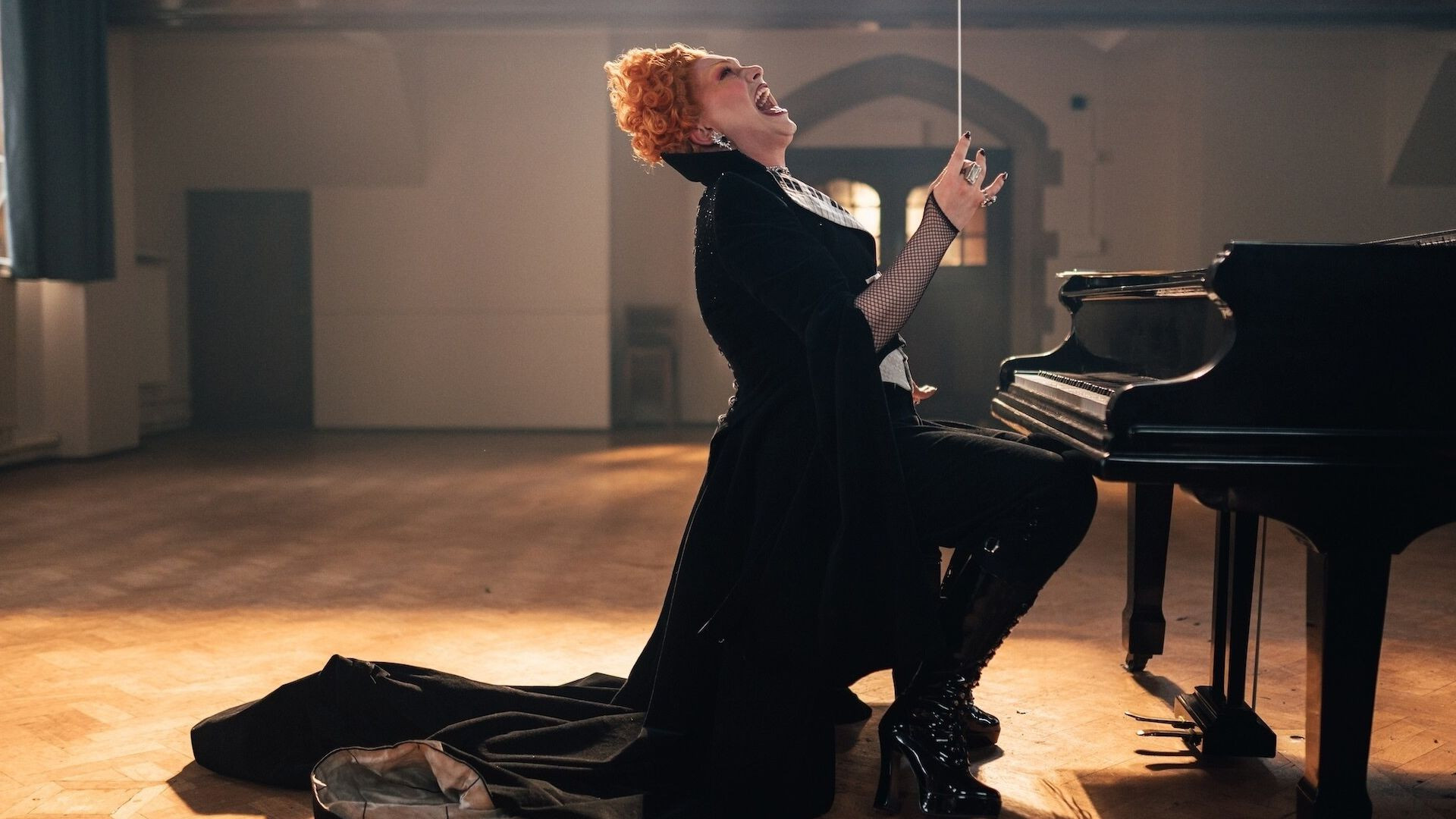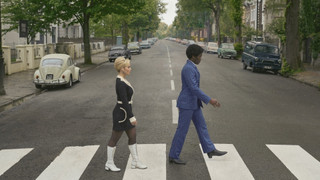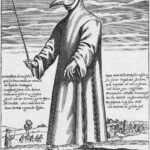The latest episode of Doctor Who, “The Devil’s Chord,” introduced a formidable new foe: Maestro. Played with flamboyant menace by Jinkx Monsoon, Maestro is not just another monster of the week; they are a god-like entity with the power to drain music from the universe. This article delves into everything you need to know about The Maestro Doctor Who villain, their motivations, their connection to classic Doctor Who lore, and what their arrival means for the Doctor and the Whoniverse.
 Jinkx Monsoon as the Maestro villain on Doctor Who holding a baton at a piano.
Jinkx Monsoon as the Maestro villain on Doctor Who holding a baton at a piano.
Who is the Maestro in Doctor Who?
Maestro, portrayed by the multi-talented Jinkx Monsoon – celebrated actor, singer, and winner of RuPaul’s Drag Race – is described by showrunner Russell T. Davies as potentially “the Doctor’s most powerful enemy yet.” This isn’t hyperbole. Maestro’s entrance is nothing short of theatrical, materializing from within musical instruments and showcasing an unsettling ability to manipulate reality through music itself.
Their powers extend beyond mere performance; Maestro can control and consume music, a terrifying prospect for a universe reliant on harmony and rhythm. This ability even allows them to exert influence over the TARDIS, the Doctor’s time-traveling vessel, hinting at a power scale that dwarfs many previous Doctor Who villains.
Maestro’s Sinister Symphony: Why Silence the Music?
Maestro’s motives are far grander than simple villainy. Their desire to silence music isn’t some petty act of discord. It’s a calculated move to amass power. As Maestro chillingly explains, “Every song that goes unsung feeds me.” This consumption of musical energy isn’t just about personal gain; it’s a step towards cosmic domination. Maestro aims to steal “the music of the spheres,” the fundamental harmony of the universe, which they believe will grant them ultimate power and bring the cosmos to a standstill.
The episode reveals the devastating consequences of Maestro’s actions. Beginning in 1925, with composer Timothy Drake inadvertently unleashing Maestro by playing a specific chord, the effects ripple through time. By 1963, the vibrant music scene of the Beatles is rendered bland and uninspired. Historical events are altered, evidenced by newspaper headlines detailing a more aggressive Soviet Union. The timeline spirals into a dystopian 2024 London, described by Maestro as a “nuclear winter,” which they consider “the purest music of all,” showcasing the villain’s warped perception of beauty and harmony.
The Toymaker’s Legacy: Maestro’s Family Ties
For long-time Doctor Who fans, Maestro’s maniacal laughter and god-like powers might ring a bell. Maestro is revealed to be the offspring of the Toymaker, a classic villain from the 1960s who made a spectacular return in the 60th-anniversary special “The Giggle,” played by Neil Patrick Harris. This familial connection establishes Maestro as part of a lineage of incredibly powerful beings within the Doctor Who universe.
While the Toymaker reigned over games and chaos, Maestro commands music. Both represent a rare breed of Doctor Who antagonists who genuinely instill fear in the Doctor. The Toymaker’s confrontation with the Doctor in “The Giggle” was so impactful it triggered the unprecedented “bigeneration,” literally splitting the Doctor in two. This legacy of power underlines the significant threat Maestro poses. Interestingly, both villains, despite their god-like status, have weaknesses. The Toymaker was defeated by a simple game, and Maestro ultimately falls victim to the creative collaboration of Lennon and McCartney, suggesting that even cosmic beings can be undone by human ingenuity and, fittingly, music itself.
 The Doctor (Ncuti Gatwa) and Ruby Sunday (Millie Gibson) in the
The Doctor (Ncuti Gatwa) and Ruby Sunday (Millie Gibson) in the
Will The Maestro Doctor Who Return? Encore or Finale?
The question of Maestro’s return hangs heavy in the air. While seemingly defeated at the episode’s conclusion, subtle hints suggest this might not be the last we see of them. Maestro’s son, Henry Arbinger, makes a brief appearance during the musical number at Abbey Road, perhaps foreshadowing future storylines and a continuation of the Maestro’s chaotic legacy.
Furthermore, Maestro’s fascination with Ruby Sunday, the Doctor’s new companion, hints at unresolved plot threads. Maestro senses “Carol of the Bells” hidden within Ruby’s soul, questioning its power and origin. This connection to Ruby, and the lingering mystery of “the Oldest One” potentially present at Ruby’s abandonment, suggests Maestro’s story is far from over and deeply intertwined with the season’s overarching narrative.
A Pantheon of Gods: More Divine Threats on the Horizon?
Maestro’s introduction is not an isolated incident but rather the opening act for a larger storyline involving a pantheon of god-like beings. The Toymaker’s warning in “The Giggle” – “my legions are coming” – is now taking shape. Showrunner Russell T. Davies has confirmed the arrival of “at least three more” gods, expanding the scope of threats the Doctor will face.
Davies refers to them as “gods of chaos,” linked to the Toymaker as a potentially supreme being within this pantheon, though he hints at further revelations and power dynamics yet to be explored. The most anticipated of these entities is “the One Who Waits,” mentioned by both the Toymaker and Maestro as an adversary even the Toymaker fears. The Fourteenth Doctor seemed unaware of this being, adding another layer of intrigue.
Speculation suggests that characters breaking the fourth wall, like Maestro and the Doctor, might be clues to their elevated status within this pantheon. This theory even extends to Ruby’s seemingly ordinary neighbor, Mrs. Flood, adding another layer of mystery to the unfolding season. As “The Devil’s Chord” emphatically reminds us, in the world of Doctor Who, “There’s always a twist at the end,” and the saga of Maestro and the gods of chaos is just beginning.
Doctor Who streams on BBC iPlayer in the UK and Disney Plus elsewhere in the world.


